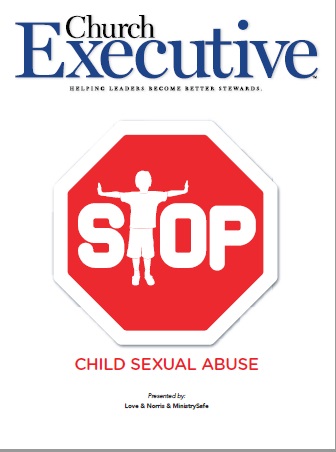
By Gregory Love & Kimberlee Norris

 “Pastor Arrested for Molesting Teens in Youth Group,” screamed a recent media headline in a heavily populated metropolitan area.
“Pastor Arrested for Molesting Teens in Youth Group,” screamed a recent media headline in a heavily populated metropolitan area.
Unfortunately, it’s not an anomaly; headlines detailing child sexual abuse in ministry contexts occur almost daily.
The reality is daunting: one in four girls and one in six boys will be sexually abused before reaching the age of 18. Two out of three children don’t disclose abuse until adulthood, if ever.
These statistics don’t skip any socioeconomic status, geographic location, ethnicity or spiritual paradigm. In one large study, the average convicted male abuser who preferred female victims had an average of 52 victims prior to prosecution. In the same study, the male abuser who preferred male victims had an average of 150 victims.
Where children are gathered for ministry purposes, the risk of child sexual abuse exists.
To effectively protect children and youth from sexual abuse, the church must learn to recognize the offender’s ‘grooming process’ and undertake effective screening practices to weed out offenders, thereby keeping the wolf out of the sheep pen.
Effective screening requires more than a criminal background check
While background checks have become a standard of care for child-serving programs, they cannot be relied upon as a standalone screening tool. Why? Because less than 10% of sexual abusers will encounter the criminal justice system, ever. More than 90% of abusers have no record to find, and they know it. A criminal background check must be included in the screening process but cannot be relied upon to identify the majority of abusers.
Effective screening is rooted in an understanding of the offender’s grooming process.
Sexual offenders come from all segments of society. Sadly, some gain access to children through church programming. Abusers groom both children and gatekeepers — trusted adults in a child’s life — to convince them that they are helpful, trustworthy, responsible people. Validated by decades of academic studies, the grooming process of the abuser is known and recognizable. Ministries should evaluate each element of the screening process with a thorough understanding of the abuser’s grooming process, common grooming behaviors, and known offender characteristics.
As an example, offenders often engage in kid-magnet activities and hobbies which are attractive to children within the offender’s age and gender of preference. If an applicant demonstrates an unusually exclusive interest in children’s activities when asked about interests or hobbies, dig a little deeper into the applicant’s past interaction with children, whether as an employee or volunteer.
CRIMINAL BACKGROUND CHECKS:
5 FACTS EVERY EXECUTIVE PASTOR SHOULD KNOW
#1: Criminal background checks are no silver bullet.
Less than 10% of sexual predators will encounter the criminal justice system. Criminal background checks cannot be relied upon as a stand-alone screening system.
#2: Churches should be looking for plea-down or ‘red flag’ offenses.
Red flag offenses, such as providing alcohol to a minor, might reveal grooming behaviors.
Plea-down offenses occur when an offense related to child sexual abuse is pled down to a lesser or non-registration offense, such as assault or indecency.
#3: There is no one-size-fits-all criminal background check.
Background checks should be keyed to ministry positions, so that the depth of check matches the extent and type of direct involvement with children.
#4: Ministries should clearly identify disqualifying offenses that automatically preclude an applicant from serving with children.
Check your state law for any mandated list of disqualifying offenses.
#5: The national criminal database sold as the ‘basic’ package by background check vendors has significant limitations and largely incomplete data.
Consider adding a county search pulled directly from county record-keepers. The majority of child sexual abuse and violent crime cases are prosecuted at the county level.
Learn more about effective criminal background checks in our next “Stop Sexual Abuse” Series installment, and at MinistrySafe.com.
Effective screening creates OPT-OUT opportunities
Skillful screening incorporates opt-out opportunities in the course of the screening process, before the applicant has access to children. When a ministry communicates current child protection practices and protocols, from the beginning, it communicates to the abuser: It might be easier somewhere else.
Applications should clearly state that all suspicions and allegations of child abuse are immediately reported to civil authorities. The Two-Adult Rule should be clearly communicated and followed. Applicants should review and sign child protection policies describing inappropriate forms of communication and physical touch. Sexual Abuse Awareness Training should occur before an applicant is interacting with children or youth.
These clear expressions, at the onset of involvement or employment, provide offenders with an opportunity to self-select out of the screening process.

Gather information about the applicant from third-party sources
Many employers ask for references, but don’t check them. Others check references but fail to ask questions meant to elicit a high-risk response.
Failing to speak with references about a prospective staff member or volunteer is one of the most common, yet detrimental, mistakes made by ministries. References represent the only third-party source of information commonly available to employers or ministry supervisors. Beyond the initial consequence of missing helpful information about an applicant, untapped references can ultimately prove to be harmful to the church, as employers might be responsible for information a reference would have communicated if the reference had been contacted.
In screening pinnacle employees, churches should make significant effort to communicate with all past ministry and child-serving employers, using a waiver signed by the applicant. The waiver should include language freeing all past employers or supervisors to freely share information or performance issues related to child protection. If the applicant exhibited boundary or judgment issues in a past position, take note.
Get a family reference
Why? Because early sexual abuse offenses occur before the abuser reaches 18 — on average, at age 13 or 14. If anyone knows of early offenses, it’s typically the family of origin.
Use questions meant to elicit a high-risk response
An applicant with inappropriate sexual motives carries with him various indicators and life patterns that help identify him as one who might not be appropriate for ministries serving children or youth. Every church should be well versed in these indicators, but few are.
Offender studies provide us with known offender characteristics and risk indicators; red flags that signify potential risk. Skillful screening requires training of intake coordinators and interviewers, providing them with information and tools to recognize high-risk responses on applications, reference forms, or during an interview. Risk indicators might disqualify an applicant for service or employment, or simply instigate follow-up questions to rule out risk.
The best predictor of future behavior is past behavior
Effective screening looks into the past behavior of each applicant. Does the applicant have a pattern of interacting with children of a specific age and gender? Does he fail to provide contact information for past work or volunteer supervisors in child-serving contexts? Is he vague about past interaction with children, or why he left a previous position? Does he describe very physical interaction with children or youth? Is he interacting with children or youth in contexts that are not easily supervised? Has he surrounded himself with ‘kid magnet’ toys or activities? Does he describe unrelated children in terminology that is unrealistic or idealistic (‘pure,’ ‘innocent,’ ‘clean’)?
Offenders often find churches to be an easy target, because the church is grace-based and church leaders tend to assume the motives of each applicant are honorable and good. Churches generally don’t do a good job of looking at an applicant’s past behavior for risk indicators.
Screen your teen applicants
Many churches use teens in volunteer ministry positions. Teens should not be counted as adults (for supervisory ratio purposes) but should be screened before serving. Criminal background checks serve little purpose where minors are concerned, but teens should complete a comprehensive screening process, including an abbreviated application, reference checks and interview. Each of these screening elements should include age-appropriate questions meant to elicit a high-risk response. The application should include a statement signed by the teen’s parent or caregiver asserting that the teen has not physically or sexually abused or molested another child in the past. Teens who have perpetrated unwanted sexually aggressive behavior upon another child in the past should not be allowed to work in child-serving contexts.
Effective screening serves as one element in an effective Safety System
Preventative protocols to protect children from sexual abuse do not end when an applicant has been thoroughly screened and approved to participate in ministry programs. Training volunteers, staff members and program leaders to understand the grooming process of the abuser is key, because your ministry leaders can’t address a risk that they don’t understand. Once training has occurred, other Safety System components come into play, including tailored policies and procedures, comprehensive reporting policies, adequate supervision, and a system to facilitate and monitor safety practices.
Need help understanding how to get started? Learn how to implement an effective Safety System with overlapping layers of protection at MinistrySafe.com.
Kimberlee Norris and Gregory Love are partners in the Fort Worth, Texas law firm of Love & Norris and founders of MinistrySafe, providing child sexual abuse expertise to ministries worldwide. After representing victims of child sexual abuse for more than two decades, Love and Norris saw recurring, predictable patterns in predatory behavior. MinistrySafe grew out of their desire to place proactive tools into the hands of ministry professionals. Love and Norris teach the only graduate-level course on Preventing Sexual Abuse in Ministry as Visiting Faculty at Dallas Theological Seminary.


